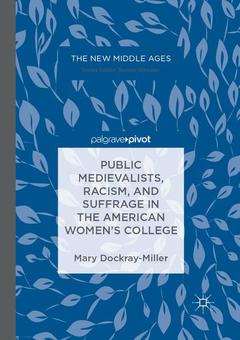Description
Public Medievalists, Racism, and Suffrage in the American Women's College, 1st ed. 2017
The New Middle Ages Series
Language: English
Support: Print on demand
Description
/li>Contents
/li>Biography
/li>Comment
/li>
This study, part of growing interest in the study of nineteenth-century medievalism and Anglo-Saxonism, closely examines the intersections of race, class, and gender in the teaching of Anglo-Saxon in the American women?s colleges before World War I, interrogating the ways that the positioning of Anglo-Saxon as the historical core of the collegiate English curriculum also silently perpetuated mythologies about Manifest Destiny, male superiority, and the primacy of northern European ancestry in United States culture at large. Analysis of college curricula and biographies of female professors demonstrates the ways that women used Anglo-Saxon as a means to professional opportunity and political expression, especially in the suffrage movement, even as that legitimacy and respectability was freighted with largely unarticulated assumptions of racist and sexist privilege. The study concludes by connecting this historical analysis with current charged discussions about the intersections of race, class, and gender on college campuses and throughout US culture.
1 ‘Anglo-Saxon’ in Late Nineteenth-Century American Academia.- 2 Anglo-Saxon and Academic Opportunities for Women, Civil War-WWI.- 3 Racism, Medievalism, and Anglo-Saxon.- 4 Anglo-Saxonists as Public Medievalists.
Provides an important examination on the history of the study of Anglo-Saxon and early medieval literature
Connects historical issues of inclusion in American academia to contemporary discussions of race, class, and gender on college campuses today
Expands knowledge of female scholars’ role in nineteenth-century medievalism
These books may interest you

A Handbook of Anglo-Saxon Studies 138.45 €



